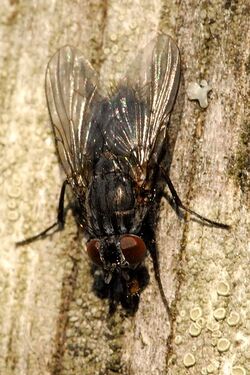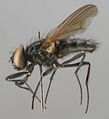Biology:Hydrotaea dentipes
| Hydrotaea dentipes | |
|---|---|

| |
| Hydrotaea dentipes female | |
| Scientific classification | |
| Domain: | Eukaryota |
| Kingdom: | Animalia |
| Phylum: | Arthropoda |
| Class: | Insecta |
| Order: | Diptera |
| Family: | Muscidae |
| Genus: | Hydrotaea |
| Species: | H. dentipes
|
| Binomial name | |
| Hydrotaea dentipes (Fabricius, 1805)
| |
| Synonyms | |
| |
Hydrotaea dentipes is a fly from the family Muscidae.[1][2] Its larvae have been found in the dung of rabbits, pigs, cows, horses, chickens and humans.[3] It is found in the Palearctic.[4]
Description
See Morphology of Diptera for terms. The thorax, seen from behind, with conspicuous whitish dusting at least in front of the suture. The middle tibia, anteriorly along almost whole length, with dense fine pubescence which is shorter than width of tibia. The discal vein of wing with a slight though distinct curve forward just before apex. Hind tibia with only 2–3 rather short anteroventral bristles. Middle femur, at base beneath, with numerous setulose hairs, many of which are more than twice as long as depth of femur. 6·5–7·75 mm.
References
- ↑ D'Assis Fonseca, E.C.M. (1968). Diptera Cyclorrhapha Calyptrata: Muscidae. Handbooks for the Identification of British Insects. 10. London.: Royal Entomological Society of London. pp. 118pp.
- ↑ Gregor, F.; Rozkosny, R.; Bartak, M.; Vanhara, J. (2002). The Muscidae (Diptera) of Central Europe. Scientiarum Naturalium Universitatis Masarykianae Brunensis. 107. Masaryk.: Masaryk University. pp. 280pp.
- ↑ Chandler, Peter J. (2010). A Dipterist's Handbook (2nd edition). Orpington, Kent, England: The Amateur Entomologists' Society. p. 164. ISBN 9780900054778.
- ↑ Fauna Europaea
External links
- D'Assis Fonseca, E.C.M, 1968 Diptera Cyclorrhapha Calyptrata: Muscidae Handbooks for the Identification of British Insects pdf
- Seguy, E. (1923) Diptères Anthomyides. Paris: Éditions Faune de France Faune n° 6 393 p., 813 fig.Bibliotheque Virtuelle Numerique pdf
Wikidata ☰ Q5955468 entry
 |


